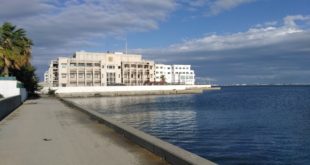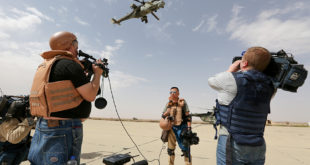Abstract This paper attempts to map the major changes and developments of British public diplomacy in the Arab world. I argue here that the BBC and the British Council have greatly assisted British public diplomacy efforts and can be regarded as effective because exerting influence in an indirect way can …
Read More »Journalism and Media Education in Times of Conflict: Three Cases from the Arab Region
Abstract This paper examines the journalism and media education programs in three countries in the Arab region (Libya, Syria, Yemen) that have been or are still in the throes of civil wars and/or polarization along conflicting political ideologies and control of different geographical zones. Based on an online questionnaire distributed …
Read More »Knowledge and Social Change: Impact of 40 Years of Health and Population Communication in Egypt
Abstract The main objective of this paper is to seek an answer to an important research question: Why did some communication campaigns on health and population issues in Egypt succeed, while others failed to make the desired impact on behavior and subsequent outcomes, such as reduced mortality or lower population …
Read More »The Creative Environment of Scientific Content Production on Social Networking Platforms (Arabic)
Scroll down for the Arabic abstract. Social Networking platforms impose new methods of creating audiovisual content, through the use of new technologies; this has also altered the nature of content production and consumption. Social networking platforms represent an ostensibly free, advanced and low-cost space, allowing the curious user to exercise …
Read More »A Critical Analysis of the Dialectic Science-Religion Relationship in Popular Science Show Discourse
Abstract In light of the advancing digital environment and the interest in boosting scientific content published on digital platforms, this paper seeks to define and critically analyze the discourse of popular science shows (henceforth, “PSS”). Considering the fact that religion serves as a major foundational component in the Arab social …
Read More »Transformations and Trends in Science Journalism as Viewed by the Egyptian Media and Scientific Community
Scroll down for the Arabic abstract. The study aims to identify the common perceptions and evaluation of the journalistic and scientific community in Egypt, of current transformations and trends in scientific journalism. The study does so, in order to determine the following: 1) The position of scientific journalism in society; …
Read More »More than Meets the Eye: A Multimodal Approach to Science-Popularizing Discourse and Representation of the ‘Other’ in a Selection of National Geographic Feature Articles
Abstract National Geographic Magazine (NGM) is an American cultural icon renowned for the dissemination of geographic knowledge, the exhilaration of cultural explorations, the popularization of science discourse, and the cultivation of visual imaginaries. Among popular science magazines, its distinctive force in the popular imagination squarely lies in the manipulation and …
Read More »The Role of Egyptian Science YouTube Channels in Promoting Scientific Literacy- An analytical study based on Media Richness Theory (Arabic)
Scroll down for the Arabic abstract. Due to the rapid technological and scientific advances nowadays, the need to improve scientific literacy has become increasingly important for Arab citizens. YouTube is a Web 2.0 video-sharing platform, widely used by ordinary citizens-called “YouTubers”- to increase the public's interest in science and science …
Read More »Applying the Four Models of Science Journalism to the Publics’ Interaction with Coronavirus News
Abstract Since the outbreak of coronavirus, also known as COVID-19, the news has been covering its rapid developments by the minute, while feeding the eager publics the information they seek regarding its origin, health-threats, symptoms, preventative measures, and global impact. It is thus of pressing importance, to track the Egyptian …
Read More »Communicating Science in the New Media Environment: The Advancement of Science Literacy
“Science literacy is the artery through which the solution of tomorrow’s problems will flow” - Neil deGrasse Tyson Abstract Science is the social foundation that encompasses all facets of life, from educating individuals, to allowing them to make informed decisions in their daily lives. Science is ultimately our way of …
Read More » Arab Media & Society The Arab Media Hub
Arab Media & Society The Arab Media Hub










